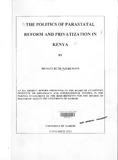| dc.contributor.author | Njeremani, Musavi R | |
| dc.date.accessioned | 2013-05-08T07:09:01Z | |
| dc.date.available | 2013-05-08T07:09:01Z | |
| dc.date.issued | 2003-09 | |
| dc.identifier.citation | Masters thesis University of Nairobi (2003) | en |
| dc.identifier.uri | http://erepository.uonbi.ac.ke:8080/xmlui/handle/123456789/20066 | |
| dc.description | Degree of master of arts in the university of Nairobi | en |
| dc.description.abstract | The study focuses on the role and impact of politics on divestiture. Specifically,
it examines the legislative and institutional frameworks of public enterprises and
privatization and the Kenyan experience in divestiture. The study assessesthe
following main question within a political context: how has divestiture been
carried out in Kenyaand what have beenthe results?
The study relied on date from publications, journals, policy papers, annual
reports and oral interviews given to individuals who have been involved in the
divestiture process. The study finds that the current legislative and institutional
framework for public enterprises and privatization is weak. The absence of a
privatization law, lack of ownership of the process, administrative hurdles/ and
ethnic and partisan interests has contributed to the weaknesses in the divestiture
process. The study concludes that divestiture is an economic necessity for
Kenya.
The study recommends the establishment of a privatization law/ and the
extensive education on the benefits of divestiture to create a sense of ownership
of the process. The removal of administrative hurdles as well as corruption in
the form of ethnic and partisan interests in the process would also reduce
opportunities for interference in the process | en |
| dc.language.iso | en | en |
| dc.publisher | University of Nairobi | en |
| dc.title | The politics of parastatal reform and privatization in Kenya | en |
| dc.type | Thesis | en |
| local.publisher | Institute of Diplomacy and International Studies | en |

